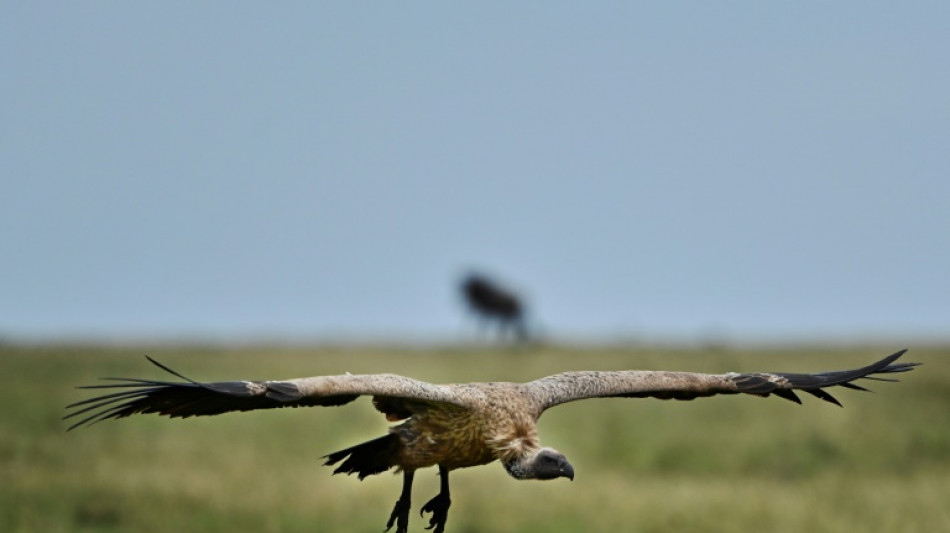
-
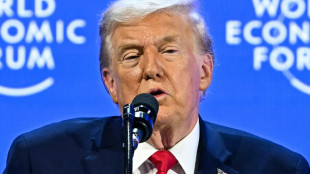 Trump rules out 'force' against Greenland but demands talks
Trump rules out 'force' against Greenland but demands talks
-
Stocks steadier as Trump rules out force to take Greenland

-
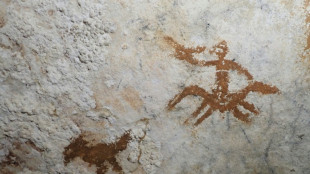 World's oldest cave art discovered in Indonesia
World's oldest cave art discovered in Indonesia
-
US hip-hop label Def Jam launches China division in Chengdu
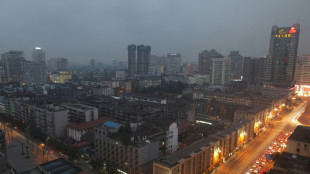
-
 Dispersed Winter Olympics sites 'have added complexity': Coventry
Dispersed Winter Olympics sites 'have added complexity': Coventry
-
Man City players to refund fans after Bodo/Glimt debacle

-
 France's Lactalis recalls baby formula over toxin
France's Lactalis recalls baby formula over toxin
-
Pakistan rescuers scour blaze site for dozens missing

-
 Keenan return to Irish squad boosts Farrell ahead of 6 Nations
Keenan return to Irish squad boosts Farrell ahead of 6 Nations
-
US Treasury chief accuses Fed chair of 'politicising' central bank

-
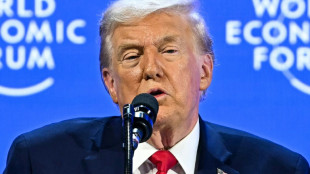 Trump rules out force against Greenland but demands 'immediate' talks
Trump rules out force against Greenland but demands 'immediate' talks
-
Israeli strike kills three Gaza journalists including AFP freelancer

-
 US Congress targets Clintons in Epstein contempt fight
US Congress targets Clintons in Epstein contempt fight
-
Huge lines, laughs and gasps as Trump addresses Davos elites

-
 Trump at Davos demands 'immediate' Greenland talks but rules out force
Trump at Davos demands 'immediate' Greenland talks but rules out force
-
Australia pauses for victims of Bondi Beach shooting

-
 Prince Harry says tabloid coverage felt like 'full blown stalking'
Prince Harry says tabloid coverage felt like 'full blown stalking'
-
Galthie drops experienced trio for France's Six Nations opener

-
 Over 1,400 Indonesians leave Cambodian scam groups in five days: embassy
Over 1,400 Indonesians leave Cambodian scam groups in five days: embassy
-
ICC rejects Bangladesh's plea to play T20 World Cup matches outside India

-
 Prince Harry says UK tabloid court battle in 'public's interest'
Prince Harry says UK tabloid court battle in 'public's interest'
-
Trump lands in Davos to push Greenland claims
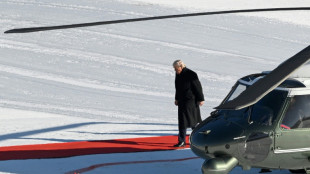
-
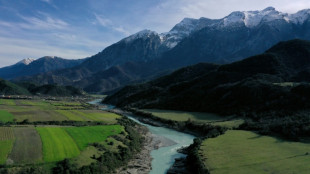 Balkan wild rivers in steady decline: study
Balkan wild rivers in steady decline: study
-
Injured Capuozzo misses out on Italy Six Nations squad

-
 Mourners pay last respects to Italian icon Valentino
Mourners pay last respects to Italian icon Valentino
-
EU parliament refers Mercosur trade deal to bloc's top court

-
 Odermatt seeks first Kitzbuehel victory with eye on Olympics
Odermatt seeks first Kitzbuehel victory with eye on Olympics
-
Italy's Brignone to be rested for Spindleruv Mlyn giant slalom

-
 Alcaraz spearheads big names into Australian Open third round
Alcaraz spearheads big names into Australian Open third round
-
European stocks dip ahead of Trump's Davos speech

-
 Trump flies into Davos maelstrom over Greenland
Trump flies into Davos maelstrom over Greenland
-
EU won't ask Big Tech to pay for telecoms overhaul

-
 Railway safety questioned as Spain reels from twin train disasters
Railway safety questioned as Spain reels from twin train disasters
-
Marcell Jacobs back with coach who led him to Olympic gold

-
 Syria army enters Al-Hol camp holding relatives of jihadists: AFP
Syria army enters Al-Hol camp holding relatives of jihadists: AFP
-
Brook apologises, admits nightclub fracas 'not the right thing to do'

-
 NATO chief says 'thoughtful diplomacy' only way to deal with Greenland crisis
NATO chief says 'thoughtful diplomacy' only way to deal with Greenland crisis
-
Widow of Iran's last shah says 'no turning back' after protests

-
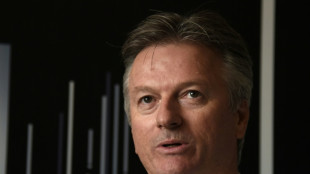 Waugh targets cricket's 'last great frontier' with European T20 venture
Waugh targets cricket's 'last great frontier' with European T20 venture
-
Burberry sales rise as China demand improves

-
 Botswana warns diamond oversupply to hit growth
Botswana warns diamond oversupply to hit growth
-
Spaniard condemns 'ignorant drunks' after Melbourne confrontation

-
 Philippines to end short-lived ban on Musk's Grok chatbot
Philippines to end short-lived ban on Musk's Grok chatbot
-
Police smash European synthetic drug ring in 'largest-ever' op

-
 Japan to restart world's biggest nuclear plant Wednesday
Japan to restart world's biggest nuclear plant Wednesday
-
South Korean ex-PM Han gets 23 years jail for martial law role

-
 Alcaraz, Sabalenka, Gauff surge into Australian Open third round
Alcaraz, Sabalenka, Gauff surge into Australian Open third round
-
Over 1,400 Indonesians left Cambodian scam groups in five days: embassy

-
 Raducanu to 're-evaluate' after flat Australian Open exit
Raducanu to 're-evaluate' after flat Australian Open exit
-
Doncic triple-double leads Lakers comeback over Nuggets, Rockets down Spurs


Africa's large birds of prey facing 'extinction crisis': study
The flamboyantly plumed Secretary Bird and the serpent-catching Snake Eagle are among dozens of Africa's large birds of prey facing a human-driven "extinction crisis" researchers said on Thursday.
Previous research has shown that rapid human and agricultural expansion has had a particularly dire impact on vultures in Africa, due to habitat change and poisoning.
But the new study by researchers at the University of St Andrews and The Peregrine Fund found that other large birds of prey -- or raptors -- that do not depend on scavenging and are less vulnerable to poisoning had also suffered similarly severe depletions.
Scientists said these large birds of prey in decline face a "double jeopardy" -- increasingly dependent on protected areas, they also have a more restricted habitat.
Unless Africa's conservation network is extended and other human threats are eased, "large raptor species are unlikely to persist over much of the continent's unprotected land by the latter half of this century", said lead author Philip Shaw, honorary research fellow at the University of St Andrews.
The study, published in Nature Ecology and Evolution, measured changes in population abundance for 42 raptor species in Niger, Burkina Faso, Mali, northern Cameroon, Kenya and Botswana during two periods, 1969 to 1995 and 2000 to 2020.
Of the birds studied, 37 species had witnessed declines, with 29 plummeting by at least 30 percent over three generational periods.
The authors concluded that as a group, Africa's diurnal raptors -- those active during the day like eagles -- "are facing an extinction crisis, with more than two-thirds of the species examined potentially qualifying as globally threatened".
- Human impact –
Larger birds are particularly at risk because they need a wider habitat and breed more slowly than smaller birds, rendering their populations less resilient.
Human threats include shooting, trapping, poisoning, electrocutions or collisions with energy infrastructure, with birds killed for food or belief-based reasons.
The animals they prey on are also targeted.
Species declines were most pronounced in West and Central Africa, where protected areas are particularly underfunded.
High regional levels of poverty and corruption have been linked to adverse conservation outcomes for numerous charismatic mammal species, according to the study.
To protect the birds, the researchers point to two solutions.
The first is to expand protected areas in Africa in line with one the goals set at the Convention of Biological Diversity (COP 15) in 2022 -- to effectively conserve and manage at least 30 percent of the world's surface by 2030.
Currently, protected areas account for just 14 percent of Africa's land and inland waters, Shaw said.
The second is to manage existing protected areas more effectively, Shaw added.
Researchers stress that effective conservation of large birds of prey is in human societies' best interests.
Vultures, for example, by scavenging carcasses can limit the transmission of zoonotic diseases to human populations, Shaw said.
The loss of big predators also has a profound effect on ecosystems.
Without them, prey populations can become unregulated and damage crops.
"In Africa, losing the largest and most uniquely adapted avian predators will most likely have the biggest impact on ecosystem function," Shaw said.
A.Ruegg--VB



